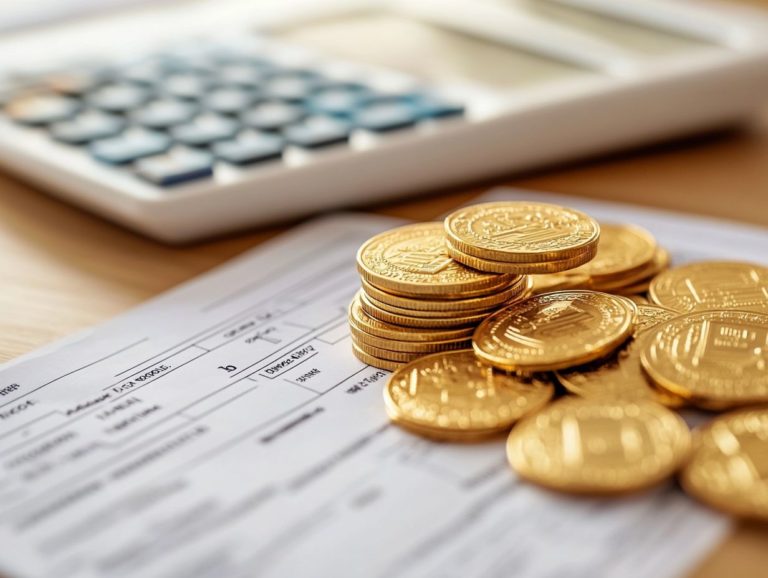Tax Compliance for Precious Metals in Different Jurisdictions
Navigating the world of precious metals is both thrilling and intricate, especially when it comes to following tax rules. As you explore investments in gold, silver, and other valuable assets, understanding the tax implications across various jurisdictions becomes essential.
This article delves into what tax compliance entails for precious metals, examining specific regulations in key countries such as the United States, Canada, the United Kingdom, and Australia. It also provides insights into reporting requirements and effective strategies.
Whether you re an experienced investor or just beginning your journey, mastering these aspects can empower you to maximize your benefits while minimizing your liabilities!
Contents
- Key Takeaways:
- Understanding Tax Compliance for Precious Metals
- Tax Implications of Precious Metals in Different Jurisdictions
- Reporting Requirements for Precious Metals
- Strategies for Tax Compliance with Precious Metals
- Frequently Asked Questions
- What Are Precious Metals and Why Are They Subject to Tax Compliance in Different Jurisdictions?
- Do I Need to Pay Taxes on My Precious Metal Investments in Different Countries?
- Are There Any Countries Where Precious Metal Investments Are Tax-Free?
- What Is the Penalty for Not Complying with Tax Laws Regarding Precious Metals?
- Do I Need to Report My Precious Metal Investments to the Government?
- Are There Any Tax Benefits or Deductions for Investing in Precious Metals?
Key Takeaways:
Tax compliance is essential for investors in precious metals to avoid penalties. It’s vital to understand the different tax implications in countries like the US, Canada, the UK, and Australia. For a comprehensive overview, check out understanding the tax effects of precious metals trading. To comply with reporting requirements, investors must be aware of forms like the IRS Form 1099-B and properly declare their precious metal holdings to tax authorities.
Understanding Tax Compliance for Precious Metals
Understanding following tax rules for precious metals is crucial for investors like you who are looking to navigate the complex world of taxation. This includes capital gains tax, sales tax, and value-added tax.
Ensuring tax compliance means you follow federal, state, and international regulations while upholding proper IRS reporting standards. By mastering the intricacies of compliance, you can take advantage of tax exemptions, minimize your tax burden, and manage your investment portfolio in precious metals be it gold, silver, platinum, or palladium effectively!
This strategic approach not only helps in preserving wealth but also provides a safeguard against economic uncertainty.
What is Tax Compliance and Why is it Important?
Tax compliance involves adhering to the tax laws and regulations set forth by government authorities. This practice is essential for maintaining lawful financial practices in investment sectors like precious metals.
It’s critical to grasp the intricacies of these regulations; non-compliance can lead to severe consequences, including hefty fines and potential legal issues. For example, the IRS mandates specific reporting requirements for capital gains when you sell precious metals, and failing to meet these can result in unexpected tax considerations for precious metals in your portfolio.
It’s also essential to stay informed about regional tax laws, which can vary significantly. In some states, there may be exemption thresholds for gold and silver sales that you should know about. By keeping yourself updated on your tax obligations for precious metals, you not only protect your investments but also enhance your overall financial integrity!
Tax Implications of Precious Metals in Different Jurisdictions
The tax implications of precious metals can vary widely across different jurisdictions. This variability shapes how you approach your purchases, sales tax responsibilities, and capital gains tax calculations.
It’s crucial for you to grasp the unique regulations in regions such as the United States, Canada, the United Kingdom, and Australia to optimize your tax-efficient investment strategies! Local taxes and international tax laws can further complicate matters, influencing your decisions regarding investment vehicles like self-directed IRAs, which allow you to invest in a wider range of assets, including precious metals.
Understanding this intricate taxation landscape will empower you to make informed choices in your precious metal investments. Stay informed about evolving tax laws now to protect your investments from unexpected liabilities!
Take charge of your tax strategy today for a brighter investment future!
United States
In the United States, you need to navigate the tax rules tied to precious metals. This includes capital gains tax, which is a tax on profits when selling investments like bullion and numismatic coins, as well as potential sales tax on purchases that can vary significantly by state.
Don t overlook this: capital gains taxes can dramatically affect your profits! They typically range from 15% to 20%, based on your income levels and how long you’ve held your investments. The IRS requires specific reporting for all your transactions, demanding accurate documentation, which can often feel complex and overwhelming.
You also need to consider state regulations, as different states have unique rules regarding sales tax exemptions or rates. This can greatly influence your decisions about where to buy or sell precious metals. Additionally, it’s important to be aware of the tax implications of trading precious metals in the market. Understanding these nuances is essential for making informed choices; overlooking them could lead to unexpected liabilities.
Canada
In Canada, if you’re investing in precious metals, be aware of the capital gains tax and the Goods and Services Tax (GST). Both of these can significantly influence how you manage your investment portfolio.
To navigate these complexities effectively, grasp the specific tax laws governing your investments in precious metals. This means recognizing available exemptions for certain forms of bullion, which can enhance your tax efficiency.
You ll also need to maintain thorough records of your transactions to comply with local standards. Keep in mind that regional tax laws vary, impacting your investment decisions as you consider the benefits of different provinces or territories.
By understanding these nuances, you can greatly enhance your overall financial strategy when it comes to investing in precious metals. Consult a tax professional to maximize your investments!
United Kingdom
In the United Kingdom, remember that precious metals are subject to capital gains tax and may also have Value Added Tax (VAT) implications. These taxes can significantly influence how you approach your purchases and sales.
This taxation framework requires a solid grasp of compliance requirements. This includes meticulous record-keeping and accurate income reporting. You ll need to navigate exemptions available for specific types of transactions, especially those involving bullion that meets certain standards.
These taxes can shape your investment strategies, making you weigh factors like timing, purchasing methods, and the particular metals you should target. Effective planning is essential to optimize your returns while remaining compliant.
Australia
In Australia, when it comes to the taxation of precious metals, you’ll encounter capital gains tax and Goods and Services Tax (GST). These can have a substantial impact on your financial outcomes as an investor in bullion and collectibles.
Understanding these tax obligations is crucial if you re considering investing in precious metals; they can greatly influence both the appeal of the investment and your overall return. Remember, capital gains tax kicks in only when the asset appreciates beyond a specific threshold, making timing a vital factor in maximizing your returns.
The GST implications can vary based on the type of metal and its intended use, so consult with tax professionals or financial advisors. By adhering to local regulations, you not only safeguard yourself from potential penalties but also enhance your overall investment strategy in a complex financial landscape.
Reporting Requirements for Precious Metals
Understanding the reporting requirements for precious metals transactions is essential for your compliance with tax laws. This is especially true when it comes to IRS Form 1099-B, which requires you to report specific taxable events associated with the sale of bullion and numismatic coins.
IRS Form 1099-B
IRS Form 1099-B is an essential document for reporting the proceeds from the sale of precious metals. It offers vital information for both you and the IRS regarding taxable events.
Accurately completing this form is crucial for ensuring compliance with federal tax regulations. This form demands detailed records of your transactions, including the date of sale, gross proceeds, and descriptions of the metals sold.
By keeping precise documentation, you can steer clear of potential penalties or audits that might arise from discrepancies in your reporting. Understanding the implications of these transactions not only helps you meet your tax obligations but also gives you the power to make informed decisions about future sales.
Ultimately, diligent record-keeping and adherence to IRS guidelines can streamline your tax filing process and protect your investment history.
Other Reporting Requirements
Don’t overlook other reporting requirements that could affect your investments! Along with IRS Form 1099-B, you must consider various other reporting requirements as an investor in precious metals to ensure compliance with tax laws and regulations.
These requirements can differ significantly based on the state in which you operate, as some states impose their own specific reporting and taxation rules for precious metals transactions. Understanding the tax implications of importing and exporting precious metals is crucial. The complexities of reporting can escalate dramatically without the expertise of tax professionals. Their guidance is invaluable in helping you understand the complex rules.
By understanding both your federal and state obligations, you can avoid unexpected penalties and remain fully informed about your financial responsibilities concerning your precious metals investments.
Strategies for Tax Compliance with Precious Metals
Strategies for tax compliance with precious metals are vital, not just for adhering to tax laws but also for maximizing your tax benefits and minimizing your tax liabilities. These elements are critical to effective financial planning and can greatly enhance your overall financial strategy.
Maximizing Tax Benefits
Maximizing the tax benefits of your investments in precious metals means knowing the best ways to save on your taxes. A keen understanding of available deductions and exemptions can effectively reduce your overall taxable income.
To achieve this, consider employing various strategies. For instance, holding precious metals in a self-directed IRA which allows you to manage your own investments offers the advantage of tax-deferred growth. Another astute approach is to invest in physically-backed exchange-traded funds (ETFs) that mirror the performance of precious metals and often come with certain tax benefits.
You can also enhance your returns by taking advantage of capital gains tax rates; simply hold onto your assets for more than a year. If you decide to sell bullion after that period, you may qualify for lower long-term capital gains taxes, allowing you to further optimize your investment strategy while remaining compliant with tax regulations.
Minimizing Tax Liabilities
Minimizing your tax liabilities when investing in precious metals requires a thorough understanding of the tax implications and government regulations surrounding these transactions. Explore various strategies to optimize your returns while remaining compliant with both local and international regulations.
For example, consider utilizing tax-advantaged accounts, like IRAs that permit precious metals investments, as they can significantly defer taxes until you make withdrawals. Grasping how taxation for precious metals secured loans applies to different types of precious metals, be it gold, silver, or platinum, is essential for making informed decisions.
Diversifying your investments across various jurisdictions can unlock potential tax benefits, as some countries provide more favorable tax treatments than others. Regular consultations with tax professionals can further enhance your ability to navigate the complexities of taxation in this intricate market.
Frequently Asked Questions
What Are Precious Metals and Why Are They Subject to Tax Compliance in Different Jurisdictions?
Precious metals, such as gold, silver, platinum, and palladium, are rare and valuable. They are used for various purposes like investment, jewelry making, and industrial use.
Due to their high value and potential for tax evasion, following tax rules in different jurisdictions is essential to ensure proper reporting and payment of taxes.
Do I Need to Pay Taxes on My Precious Metal Investments in Different Countries?
Yes, it s important to understand the tax laws and regulations in each country where you hold precious metal investments. Depending on the type of metal, its value, and the country’s tax laws, you may be subject to taxes such as capital gains tax, sales tax, or value-added tax (VAT).
Are There Any Countries Where Precious Metal Investments Are Tax-Free?
Are you curious about tax-free options? Countries like Switzerland, Singapore, and Hong Kong might have what you re looking for. However, consult a tax professional to grasp the laws and regulations in these countries before making any investments.
What Is the Penalty for Not Complying with Tax Laws Regarding Precious Metals?
The penalties for not following tax rules can vary depending on the jurisdiction. They can include fines, interest on unpaid taxes, and even criminal charges. Don t risk penalties! Always report and pay taxes on your precious metal investments to avoid trouble.
Do I Need to Report My Precious Metal Investments to the Government?
In most countries, you are required to report your precious metal investments to the government, especially if they exceed a certain value. This is crucial for preventing tax evasion. Familiarize yourself with the reporting requirements in your jurisdiction.
Are There Any Tax Benefits or Deductions for Investing in Precious Metals?
Some countries offer tax benefits or deductions for investing in precious metals to encourage investment and stimulate their economy. However, these benefits vary by jurisdiction, so consult with a tax professional to understand the specific laws and regulations in your country.













